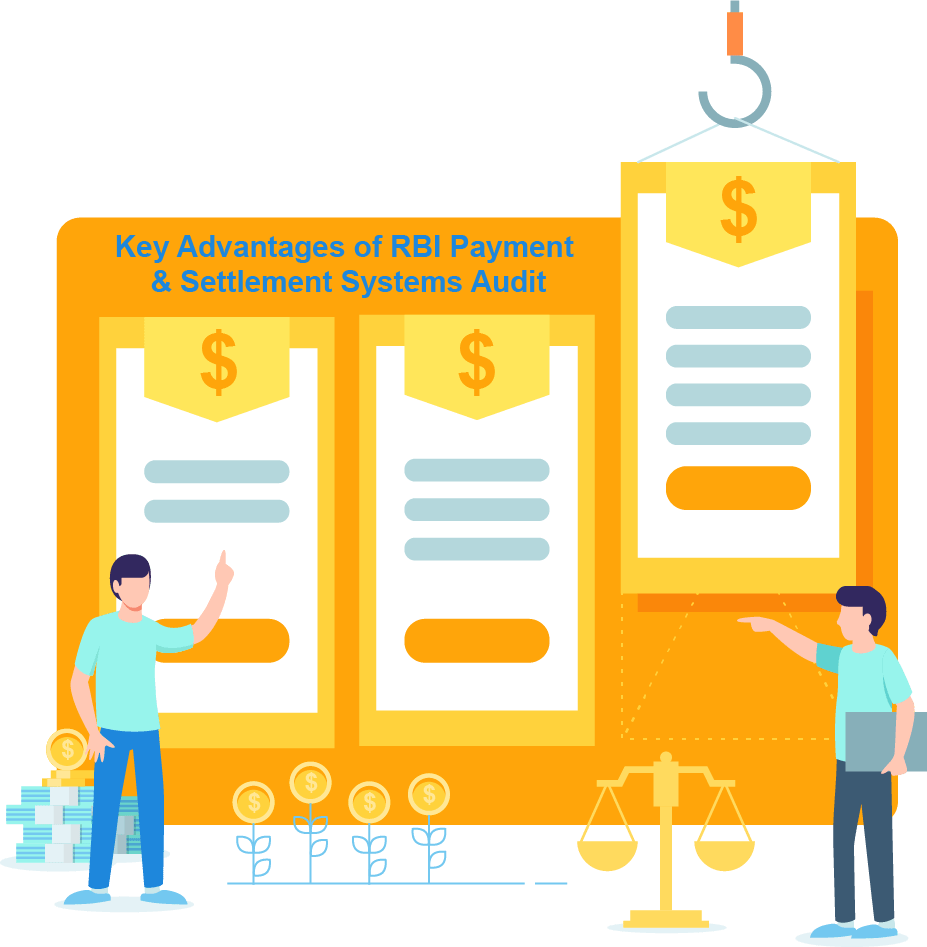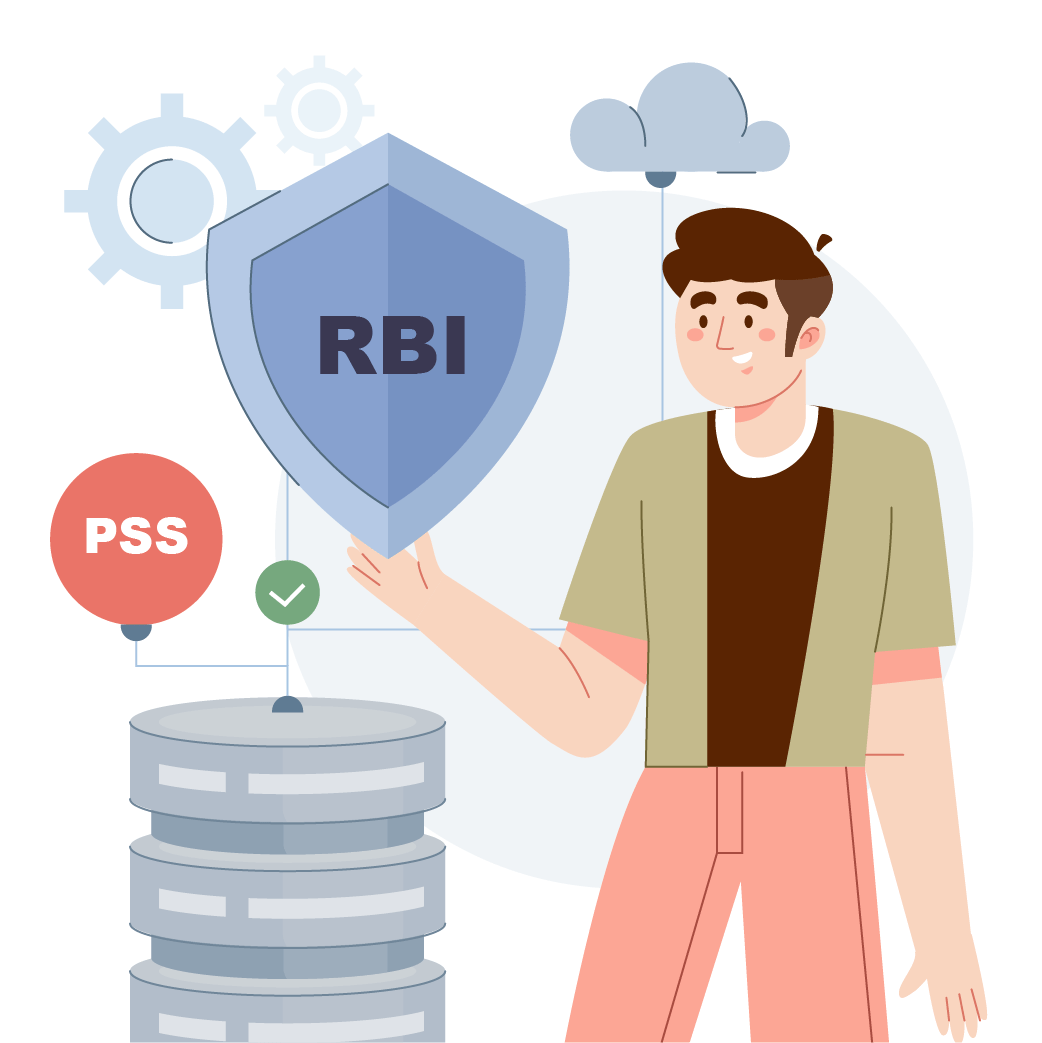The world is becoming increasingly digital, with more and more transactions being conducted online. As a result, ensuring the security and reliability of RBI payment and settlement systems audit services has become a top priority for businesses across India. This is where Securium Solutions comes in. Our RBI Payment & Settlement Systems Audit services provide businesses with the assurance that their systems are secure, reliable, and compliant with RBI guidelines.
At Securium Solutions, we understand the unique challenges faced by businesses operating in the digital landscape. Our experienced auditors have the knowledge and expertise to identify potential risks and vulnerabilities in payment and settlement systems, and provide customized recommendations to mitigate those risks.
We believe that conducting an RBI PSS Audit is not just a mandatory requirement, but an essential step toward ensuring the long-term success of any organization operating in the digital space. By partnering with Securium Solutions, businesses can take proactive steps to enhance their security posture, streamline their operations, and maintain compliance with RBI regulations.
Our commitment to delivering high-quality services and customized solutions has earned us a reputation as one of the leading PSS Audit Services Companies in India. We take pride in helping businesses stay ahead of potential threats and achieve their goals in the digital landscape.
The RBI Payment & Settlement Systems Audit Services are required to ensure the safety and reliability of payment and settlement systems in India. The RBI is responsible for regulating payment and settlement systems in the country, and its guidelines are designed to protect the interests of consumers and maintain the stability of the financial system.
In recent years, there has been a significant increase in the volume and value of digital transactions in India, and this trend is expected to continue in the future. This growth in digital transactions has also led to an increase in cyber threats, including fraud, data breaches, and cyber-attacks.
To mitigate these risks, the RBI has established a robust regulatory framework for payment and settlement systems, which includes guidelines for security, reliability, efficiency, and compliance. The RBI PSS Audit is a mandatory requirement for all entities that operate payment and settlement systems, and it ensures that these entities are complying with the RBI’s guidelines and regulations.
In addition to being a regulatory requirement, the RBI PSS Audit is also an important step towards building trust and confidence among customers and stakeholders. It demonstrates that organizations are committed to protecting the interests of their customers and maintaining the stability of the financial system.

Approaches of RBI Payment & Settlement Systems Audit

The RBI Payment & Settlement Systems Audit follows a systematic approach to evaluate the security and resilience of payment and settlement systems. The audit approach involves the following steps:
Planning: The audit begins with the planning stage, where the auditor defines the audit objectives, scope, and methodology. The auditor also identifies the key stakeholders, including the management and technical teams, to ensure that all relevant aspects of the payment and settlement systems are covered.
Fieldwork: In this stage, the auditor conducts detailed reviews of the payment and settlement systems, including the policies, procedures, controls, and system configurations. The auditor also performs testing of key controls to evaluate their effectiveness in mitigating risks.
Reporting: The auditor prepares a detailed report summarizing the findings of the audit. The report includes recommendations for corrective actions to address the identified risks and vulnerabilities. The auditor also provides a rating of the overall security and resilience of the payment and settlement systems.
Follow-up: After the audit report is issued, the auditor works with the management and technical teams to ensure that the recommendations are implemented. The auditor also performs a follow-up review to evaluate the effectiveness of the corrective actions taken.
The audit approach is designed to be comprehensive and flexible, allowing the auditor to tailor the audit to the specific needs of the organization. The auditor uses a risk-based approach to prioritize the areas of the payment and settlement systems that require the most attention.
There are several benefits of conducting an RBI Payment & Settlement Systems Audit, including:
Compliance with RBI Guidelines: The audit helps organizations ensure that they are compliant with the RBI’s PSS guidelines and regulations, reducing the risk of penalties and reputational damage.
Identification of Risks: The audit identifies potential risks and vulnerabilities in the payment and settlement systems, enabling organizations to take corrective actions before a breach occurs.
Improved Security Posture: The audit helps organizations improve their overall security posture by identifying gaps in their compliance framework and recommending best practices.
Enhanced Efficiency: By identifying inefficiencies in the payment and settlement systems, the audit helps organizations streamline their operations and improve their overall efficiency.


The scope of the RBI Payment & Settlement Systems Audit is broad and covers various aspects of payment and settlement systems, including:
Governance and Management: The audit evaluates the governance and management framework of payment and settlement systems, including policies, procedures, and controls.
Security: The audit assesses the security controls in place to protect against cyber threats, including access controls, network security, and incident response procedures.
Operational Resilience: The audit evaluates the operational resilience of payment and settlement systems, including business continuity planning, disaster recovery, and system availability.
Compliance: The audit ensures that payment and settlement systems are compliant with relevant regulations and guidelines, including those issued by the RBI.
System Architecture and Design: The audit assesses the system architecture and design of payment and settlement systems, including scalability, reliability, and interoperability.
Data Privacy and Protection: The audit evaluates the data privacy and protection measures in place to protect customer data and prevent unauthorized access.
Fraud Prevention: The audit assesses the fraud prevention mechanisms in place to prevent fraudulent transactions and protect the interests of customers.
Third-Party Service Providers: The audit evaluates the risks associated with third-party service providers, including due diligence, contract management, and oversight.
Security Controls: Organizations must implement robust security controls to protect against cyber threats, including access controls, encryption, and network security measures. They must also have procedures in place to respond to security incidents and breaches.
Business Continuity Planning: Organizations must have a business continuity plan in place to ensure the uninterrupted operation of payment and settlement systems in the event of a disruption or disaster.
Data Privacy and Protection: Organizations must have measures in place to protect customer data and prevent unauthorized access. This includes encryption, access controls, and regular monitoring and testing of security controls.
System Architecture and Design: Organizations must ensure that their payment and settlement systems are designed and configured to be scalable, reliable, and interoperable with other systems. They must also have measures in place to prevent system failures and disruptions.
Fraud Prevention: Organizations must implement mechanisms to prevent fraudulent transactions and protect the interests of customers. This includes transaction monitoring, alert mechanisms, and regular review of fraud prevention measures.
Third-Party Service Providers: Organizations must conduct due diligence on third-party service providers and ensure that they meet the same standards for security and compliance as the organization itself.


Experience: Securium Solutions has extensive experience in conducting RBI PSS Audits for organizations across various industries. Their team of experts has deep knowledge and expertise in PSS guidelines and regulations and can provide valuable insights and recommendations to ensure compliance and improve security posture.
Customizable Audit Approach: Securium Solutions provides a customizable audit approach that can be tailored to the specific needs of each organization. Their team of experts works closely with organizations to understand their unique requirements and develop an audit plan that meets their specific needs.
Emphasis on Best Practices: Securium Solutions places a strong emphasis on best practices for PSS compliance and security. They provide valuable insights and recommendations on how organizations can improve their security posture and ensure compliance with RBI guidelines and regulations.
Strong Reputation: Securium Solutions has a strong reputation in the industry for providing high-quality PSS audit services. They have a proven track record of helping organizations improve their security posture and ensure compliance with RBI guidelines and regulations.
When it comes to conducting an RBI Payment & Settlement Systems Audit services in India, organizations often have several questions related to costing, timing, and other aspects of the audit process. Here are some key security questions that you should ask before starting an RBI PSS Audit:
The cost of an RBI PSS Audit varies depending on several factors, including the size and complexity of the payment and settlement systems, the number of locations that need to be audited, and the level of customization required. It is best to request a quote from the audit service provider to get a better understanding of the costs involved.
The duration of an RBI PSS Audit also depends on several factors, including the size and complexity of the payment and settlement systems, the number of locations that need to be audited, and the level of customization required. Typically, an RBI PSS Audit can take anywhere from a few weeks to a few months.
The most important question is that what is the scope of the RBI PSS Audit? The audits includes a comprehensive evaluation of the payment and settlement systems to ensure compliance with RBI guidelines and regulations. The audit covers various aspects, including risk assessment, internal controls, security, and operational procedures.
The audit approach is customized based on the unique requirements of each organization. The audit service provider works closely with the organization to understand its specific needs and develops an audit plan that prioritizes areas of the payment and settlement systems that require the most attention.
The key deliverables of the RBI PSS Audit include a detailed audit report that highlights areas of non-compliance and recommendations for corrective actions. The report also includes an executive summary, risk assessment, and a summary of the audit findings.
The audit service provider has robust policies and procedures in place to ensure confidentiality and data security. These include secure data storage, restricted access to sensitive information, and adherence to data protection laws and regulations.
The benefits of conducting an RBI PSS Audit include compliance with RBI guidelines and regulations, identification of potential risks and vulnerabilities in the payment and settlement systems, improved security posture, and enhanced efficiency.